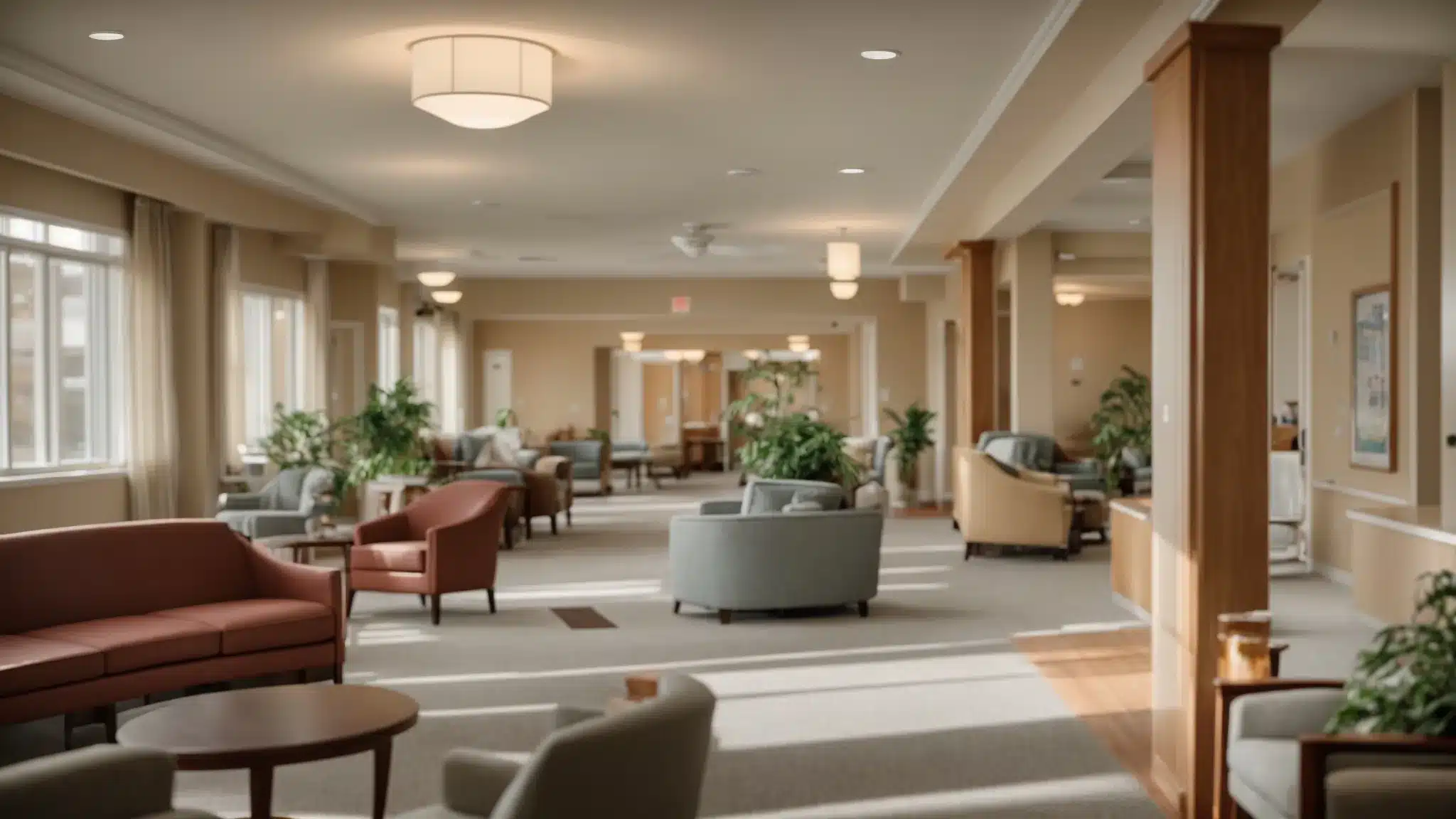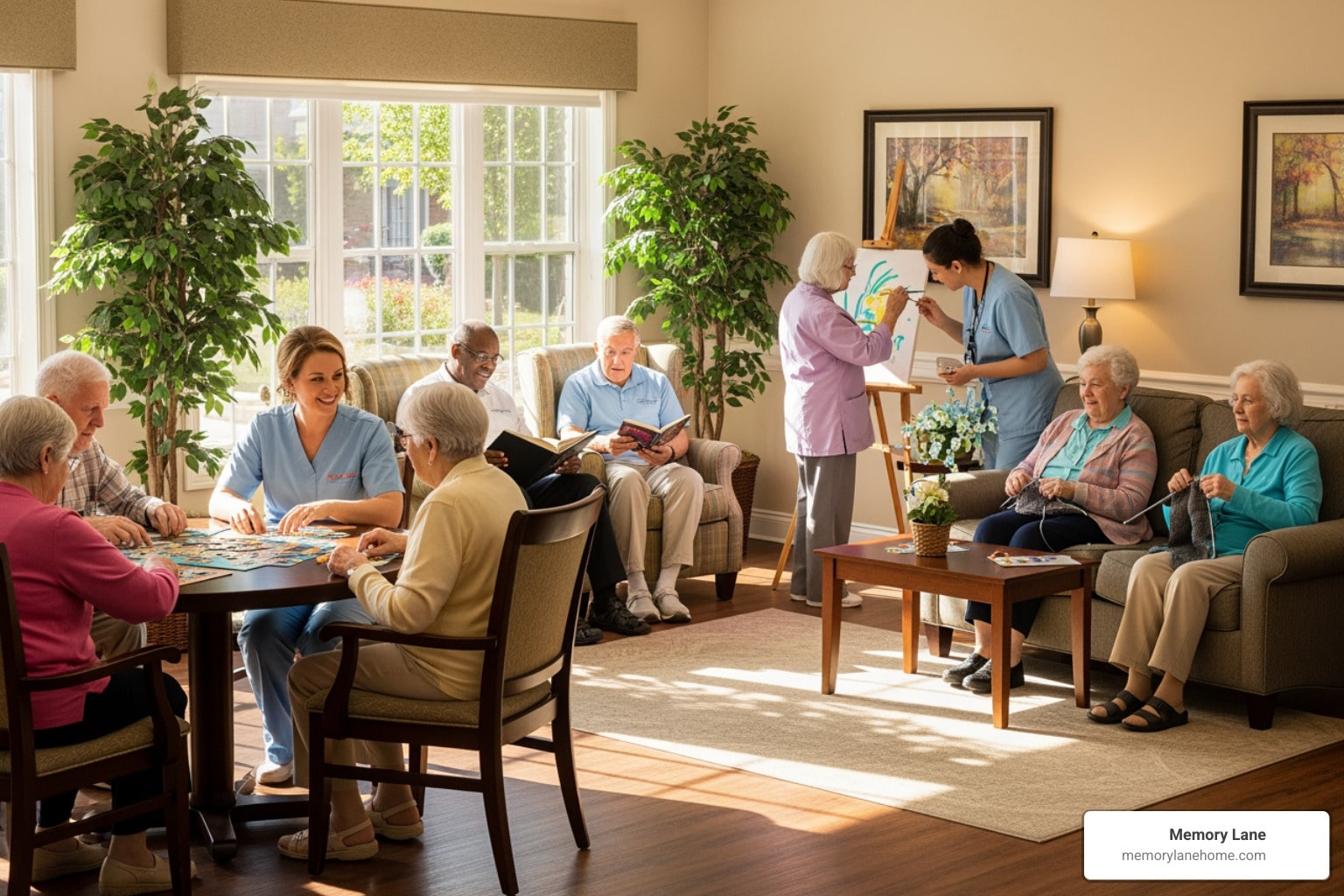Your guide to assisted living Michigan: explore costs, services, financial aid, and top communities for senior care.

Dementia Care Standards in Michigan Skilled Nursing Homes
Dementia Care Standards in Michigan Skilled Nursing Homes
Finding the right skilled nursing home for a loved one with dementia can induce significant stress for families. In Michigan, understanding the dementia care standards governing these facilities is crucial for ensuring quality support. This article examines key regulations, quality of life considerations, and how families can assess care quality in Michigan’s nursing homes. By engaging with this content, readers will gain insights that address their concerns while accessing valuable resources related to senior living, Medicaid, and AARP support. Equip yourself with the knowledge needed to navigate this challenging process effectively.
Key Takeaways
- Michigan regulations set essential care standards for skilled nursing homes managing dementia patients
- Effective staffing ratios are crucial for providing personalized attention in dementiacare facilities
- Individualized care plans enhance residents’ quality of life by addressing specific needs and preferences
- Family involvement significantly impacts the quality of care in memorycare homes
- Ongoing policy changes and advancements in treatment improve dementia care standards in Michigan
Understanding Dementia Care Standards in Michigan

Dementia significantly alters memory and cognitive abilities, demanding specialized care tailored to individual needs. The Michigan Department of Health and Human Services establishes vital care standards for skilled nursing homes, guiding facilities in meeting the challenges posed by this disease. Topics will cover regulations, the role of Michigan Medicaid, and best practices to ensure quality care for residents.
Overview of Dementia and Its Impact on Care Needs
Dementia is a progressive condition that affects cognitive functions and memory, leading to heightened care needs among those impacted. In southeast Michigan, adherence to regulations set by the Michigan Department of Health and Human Services influences how skilled nursing homes deliver care tailored to dementia patients. Facilities must employ strict medication management protocols and offer supportive services, including financial guidance such as reverse mortgage options for families navigating the costs of care within Ottawa and beyond. Additionally, dementianursing homes michigan are essential in providing specialized support and resources to both patients and their families.
Role of the Michigan Department of Health and Human Services in Care Standards
The Michigan Department of Health and Human Services plays a critical role in shaping dementia care standards across assisted living facilities and skilled nursing homes. This organization establishes regulations that mandate quality care and safety protocols, ensuring that patients receive the necessary support while also providing guidance on health insurance options that can alleviate financial burdens for families. For those considering a move to a retirementvillage, the department’s regulations can help families make informed decisions, allowing them to schedule a tour of facilities that meet specific care criteria and have the necessary resources to accommodate individuals with dementia effectively.
Dementia care standards set the stage, but the heart of the matter lies in the rules that govern skilled nursing homes. Understanding these key regulations is essential for ensuring quality care for those affected.
Key Regulations Governing Skilled Nursing Homes for Dementia

Licensure requirements for Michigan skilled nursing homes establish foundational standards for memory care services, ensuring facilities meet regulations for safety and quality. Mandated staffing ratios are essential for effective dementia care, providing adequate support for residents. Training and certification standards for caregivers further enhance the level of care delivered, directly impacting memory care costs and the overall quality of the assisted living experience.
Licensure Requirements for Michigan Skilled Nursing Homes
Licensure requirements for skilled nursing homes in Michigan play a pivotal role in ensuring that facilities provide appropriate care for individuals with dementia. Nonprofit organizations overseeing such homes must comply with state regulations that dictate staffing levels, training protocols, and emergency response plans to guarantee the safety and well-being of residents. By establishing these standards, Michigan aims to uphold the integrity of home care services and enhance the quality of skilled nursing care services for those affected by dementia.
- Licensure is essential for skilled nursing homes to operate legally in Michigan.
- Nonprofit organizations must adhere to staffing and training regulations.
- Emergency response plans are critical to ensure resident safety.
- Quality of care directly relates to adherence to these licensure requirements.
Mandated Staffing Ratios for Effective Dementia Care
Mandated staffing ratios in Michigan skilled nursing homes are crucial for delivering effective dementia care, directly influencing the quality of life for residents. These ratios ensure that each patient receives adequate attention and support from caregivers, which is essential for managing the unique challenges presented by dementia. Care homes that maintain these staffing levels are better equipped to meet the emotional and physical needs of residents, ultimately enhancing their overall experience and satisfaction.
Training and Certification Standards for Caregivers
Training and certification standards for caregivers in Michigan’s skilled nursing homes are fundamental for providing quality dementia care. Facilities are required to ensure that staff undergo specialized training that includes essential aspects such as communication strategies and crisis management techniques, ensuring they can effectively meet the unique needs of residents. Proper training not only enhances caregiver skills but also boosts the overall quality of care, addressing critical areas like meal management and emotional support, which directly influence residents’ satisfaction and well-being:
- Specialized training enhances communication skills with dementia patients.
- Certification ensures staff are knowledgeable about patient needs and safety procedures.
- Training programs often cover financial aspects, including understanding the implications of power of attorney and income eligibility for family financial planning.
- Effective training directly impacts the overall quality of care and resident satisfaction in care facilities.
Regulations shape the care within skilled nursing homes, but the heart of the matter lies in how these rules impact daily life for those with dementia. Understanding quality of life in dementia care reveals what truly matters in each resident’s journey.
Quality of Life Considerations in Dementia Care

Individualized care plans are essential for enhancing the quality of life for residents in skilled nursing homes. Techniques for improving communication with residents play a vital role in building trust and ensuring comfort. Engaging activities provide cognitive stimulation, fostering social interaction and mental engagement. These components are critical in meeting standards set by the Michigan Department of Health and Human Services and optimizing senior living options, including those in Wyoming and provided by Beaumont Health.
Importance of Individualized Care Plans
Individualized care plans are vital in skilled nursing homes for residents with dementia, as they address each person’s specific needs and preferences. These plans often incorporate strategies related to behavior management, nutrition, and assistance with activities of daily living, ensuring comprehensive support. Families may also consider including elements of estate planning to help navigate the financial aspects that arise from long-term care, all while collaborating closely with the physician to optimize recovery and well-being:
Techniques for Enhancing Communication With Residents
Effective communication techniques are vital in memorycare facilities, particularly for enhancing the quality of life for residents with dementia. Utilizing simple language and maintaining eye contact can significantly improve interactions, making individuals feel more understood and valued. In residential care settings, caregivers can employ strategies such as using familiar names or referencing personal history, which may trigger positive memories and foster meaningful connections with residents, addressing their emotional needs and enhancing overall accessibility in health care.
Engaging Activities and Their Role in Cognitive Stimulation
Engaging activities play a crucial role in cognitive stimulation for residents in Michigan skilled nursing homes, directly impacting their overall well-being. By integrating social and recreational programs tailored to individual preferences, these activities not only enhance mental engagement but also foster social connections among seniors. Additionally, facilities must ensure that these programs align with dietary considerations and legal aid resources available to families seeking assistance with care policies, ultimately promoting a better quality of life for individuals with dementia:
Quality of life matters deeply in the care of those with dementia. Next, the focus shifts to the standards and conditions shaping the experience in facilities across Michigan.
Assessing the Quality of Dementia Care in Michigan Facilities
Evaluating the quality of care in Michigan’s memorycare facilities involves various tools and methods designed to assess performance effectively. Family involvement plays a critical role in this assessment process, ensuring that caregivers prioritize essential needs such as nutritious meals on wheels and engaging therapy options. Additionally, incorporating resident feedback allows facilities to enhance services continually, fostering an environment that supports not only physical well-being but also social interaction, exemplified by thoughtfully designed courtyards.
Tools for Evaluating Care Home Performance
Evaluating the performance of memorycare homes in Michigan involves a variety of tools that provide essential insights into the quality of care offered to residents. Senior living advisors play a crucial role in this assessment process, helping families navigate choices while considering factors such as compassion in caregiving and overall resident satisfaction. Additionally, understanding financial aspects, like mortgage options and available support for family members in each county, can aid in making informed decisions about the best facilities suited for their loved ones.
Family Involvement in the Assessment Process
Family involvement in the assessment process of dementiacare facilities is essential for ensuring quality support for residents. Families can play a pivotal role by voicing their observations about the physical therapy services provided and the overall living conditions within the assisted living rooms. Engaging in regular communication with caregivers not only facilitates a better understanding of the care received but also empowers families to advocate for appropriate resources, such as veteran support programs and adult foster care options, tailored to their loved one’s needs.
Utilizing Resident Feedback for Continuous Improvement
Utilizing resident feedback in Michigan skilled nursing homes is essential for continuous improvement in dementia care standards. Caregivers can gather insights through regular surveys or informal conversations, allowing them to assess the satisfaction levels and address specific needs of residents. Engaging with residents not only helps to identify potential risks in elderly care but also empowers families to connect with a senior living advisor, who can provide additional resources and support, ultimately enhancing the overall quality of care provided.
Finding the right place for loved ones can feel heavy. Next, the focus shifts to resources that can help families in making this important choice.
Resources for Families Considering Skilled Nursing Homes
Families considering dementianursing homes in Michigan should understand key steps when selecting a facility, such as assessing care options and the qualifications of staff, including nurse practitioners. Additionally, navigating financial assistance options can help manage costs related to assets, providing relief for families in Kent and surrounding areas. Available community support services further enhance the decision-making process for finding the right care solutions.
Steps to Take When Choosing a Dementia Care Facility
When selecting a dementia care facility, families should start by researching available options in Michigan, paying close attention to those with strong geriatrics programs. Visiting potential homes allows families to observe the environment and interact with staff to gauge their expertise in dementia care. It’s also beneficial to inquire about the facility’s adherence to state regulations, including licensure and staffing ratios, ensuring that the chosen home prioritizes the safety and well-being of residents, similar to those standards upheld in Wisconsin.
Navigating Financial Assistance Options
Navigating financial assistance options can be challenging for families choosing skilled nursing homes for dementia care in Michigan. Various programs, including Medicaid, Medicare, and local assistance initiatives, can help manage the costs associated with long-term care. Families should explore eligibility requirements and available benefits, which can significantly alleviate financial burdens while ensuring access to high-quality care for their loved ones:
Community Support Services Available in Michigan
In Michigan, various community support services are available to assist families navigating the complexities of selecting skilled nursing homes for dementia care. These services include local agencies that offer guidance on available facilities, eligibility for financial assistance programs, and educational resources tailored to understanding dementia care standards. Families can benefit significantly from engaging with these community resources to gain deeper insights into their options and ensure their loved ones receive the highest quality care possible:
- Local support groups that provide emotional and social resources.
- Education programs about dementia care options and best practices.
- Access to financial assistance programs that help alleviate costs.
- Consultation services to match families with appropriate care facilities.
As families weigh their options, the landscape of care continues to shift. In Michigan, new standards are emerging, promising hope and better support for those facing the challenges of dementia.
Future Trends in Dementia Care Standards in Michigan
Innovations in dementia treatment and management are shaping the future of care standards in Michigan skilled nursing homes. Ongoing policy changes are adjusting regulations to enhance these care standards, ensuring facilities can better support residents. Advocacy plays a crucial role in driving improvements in dementia care, emphasizing the need for continued enhancement of services and resources available to families and caregivers.
Innovations in Dementia Treatment and Management
Innovations in dementia treatment and management are increasingly influencing care standards in Michigan’s skilled nursing homes. Advanced technologies, such as electronic health records and telehealth services, improve communication among caregivers while providing real-time health monitoring for residents. Furthermore, evidence-based therapeutic approaches, including music and art therapy, are being incorporated into care plans, fostering emotional well-being and engagement in residents, which ultimately enhances their quality of life.
Ongoing Policy Changes Impacting Care Standards
Ongoing policy changes in Michigan are increasingly focusing on enhancing care standards for dementia patients in skilled nursing homes. These modifications aim to integrate evidence-based practices and emphasize individualized care, ensuring facilities can better meet the unique needs of residents. By fostering a regulatory environment that prioritizes quality care and innovative treatment approaches, stakeholders are addressing common challenges faced by families and caregivers in dementia management.
Importance of Advocacy for Dementia Care Improvements
Advocacy for dementia care improvements plays a significant role in enhancing the standards of care within Michigan skilled nursing homes. Engaging community organizations, families, and healthcare professionals fosters a collaborative approach to address the unique challenges faced by dementia patients. By raising awareness and encouraging policy changes, advocates can help ensure that facilities implement best practices, improving the overall quality of life for residents and supporting families navigating the complexities of dementia care.
Essential Takeaways on Dementia Care Standards in Michigan
Dementia care standards in Michigan skilled nursing homes are essential for ensuring quality and personalized care for residents. Compliance with regulations established by the Michigan Department of Health and Human Services enables facilities to meet the specific needs of individuals living with dementia. By prioritizing staff training, mandated staffing ratios, and individualized care plans, these homes significantly enhance the well-being and satisfaction of their residents. Families navigating dementia care options benefit from understanding these standards, allowing them to make informed decisions that support their loved ones’ unique needs.


